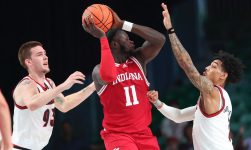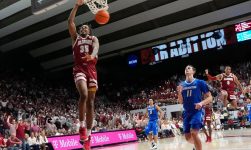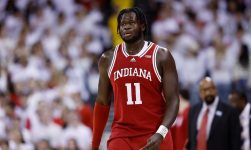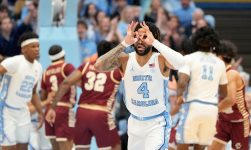The University of Louisville has been spared from significant and damaging NCAA sanctions by the IARP, sources told CBS Sports on Thursday. The IARP later announced Louisville’s penalties which placed the Cardinals on two years of NCAA probation, but did not include a postseason ban.
The school was handed a $5,000 fine, assessed a seven-day reduction in recruiting days and given two years of probation for its role in both the 2017 FBI investigation into bribery in college recruiting under former coach Rick Pitino, and for follow-up Level III violations that occurred under former coach Chris Mack. There are additional recruiting-related restrictions in place for the 2022-23 academic year, including two-week bans on unofficial visits and any kind of communication with recruits.
Louisville was not given a postseason ban, and Pitino and Mack avoided punishment entirely. Pitino, 70, is the coach at Iona, while Mack hasn’t returned to coaching since his firing from Louisville in January.
Louisville reacted by criticizing the IARP for the length of the process, which concluded more than five years after the first arrests and public release of the federal investigation into corruption in bribery in college basketball.
“While the IARP process provided the opportunity for our case to be heard by an objective panel, a five-year process is much too long,” The university said in a statement. “The process left the University of Louisville’s men’s basketball program in limbo and created significant competitive disadvantages. When allegations in this matter first came to light several years ago, the University took these allegations seriously and acted immediately, enacting several sweeping changes to strengthen our policies and procedures to prevent this from happening again. For our University, the Louisville community, our men’s basketball program and our passionate fans, today marks the beginning of a new chapter and we are only looking forward.”
Pitino avoiding penalty entirely comes years after he was ousted at Louisville in 2017 as part of the investigation. In a call with reporters on Thursday, he praised the IARP for its meticulous probe while expressing sadness that the committee will dissolve in 2023.
“I’m not going to knock the NCAA because I’m part of the NCAA … but [the IARP hearing] was much more professional,” Pitino said comparing his experience with investigations by the NCAA in the past.
“I’m against hearsay,” he continued. “And hearsay isn’t a part of the IARP process.”
Pitino also added that, had the IARP investigated Louisville in the Katina Powell case and not the NCAA, he believes Louisville’s 2013 championship banner would still be hanging from the rafters at the KFC Yum! Center.
“We have our 10th anniversary coming up from 2013,” he said. “You can’t take championships away. We beat Michigan, we beat Wichita State with hard work ethic, great defense, unselfish offense. You can’t take that away from them. If the IARP was involved in looking at that case, that banner would still be hanging today.”
Two show-causes were handed down in the case: Former Louisville assistant Kenny Johnson, now an assistant at Rode Island, was given a two-year show-cause that includes language prohibiting him from some recruiting activity. A source told CBS Sports that this means Johnson will be allowed to remain on staff as a full-time assistant coach, but he will be barred from recruiting during the live periods of April and July in 2023 and 2024. Former Louisville assistant Jordan Fair was also assessed a two-year show-cause. Fair has been out of Division I basketball since he was fired by Louisville in 2017.
Johnson was hired this spring by Archie Miller at Rhode Island. It was Johnson who was alleged to have helped influence former five-star prospect Brian Bowen’s recruitment to Louisville in 2017. Bowen’s father testified in federal court that Johnson arranged for a $1,300 payment to sway Bowen to play at Louisville. (After initially committing there, he never did.) According to the IARP’s findings, Johnson misled case investigators in 2019. It was an aggravating factor in their decision to hand down the show-cause order. His punishment was lightened when he later was more cooperative and transparent with investigators.
The IARP could not corroborate all the accusations tying Johnson’s alleged actions to steering Bowen to Louisville, and because of that, he avoided severe sanctions.
Louisville’s case has been more than five years in the making. After a heat-of-the-moment, would-be extortion attempt was made against Mack by one of his former assistants in 2021, the IARP and Louisville negotiated to include the minor discretions under Mack and fold all the particulars into one case. The rule-breaking under Pitino happened in 2016 and 2017, while the minor transgressions in Mack’s tenure ranged from 2018-21, per the IARP’s findings.
The IARP process does not enable schools or affected parties to appeal decisions. Everything in Thursday’s ruling is final.






